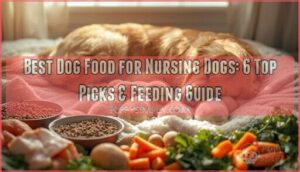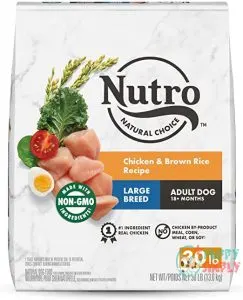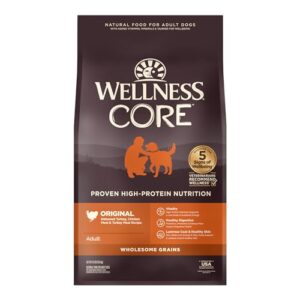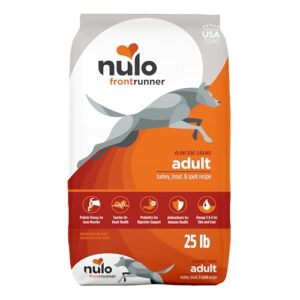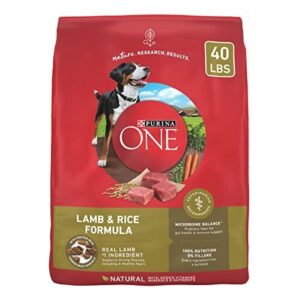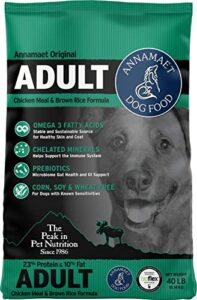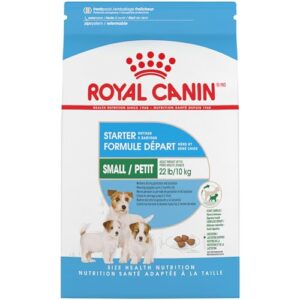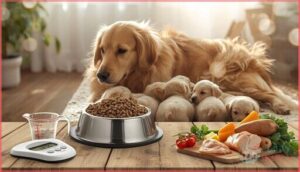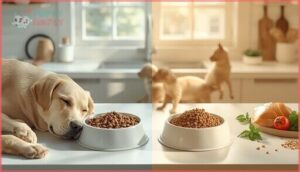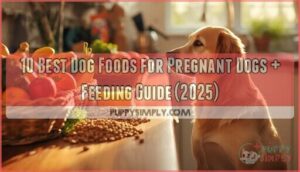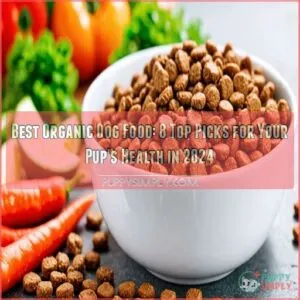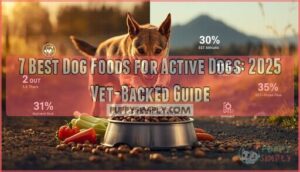This site is supported by our readers. We may earn a commission, at no cost to you, if you purchase through links.
A nursing dog’s nutritional demands can triple compared to her regular maintenance needs, placing immense stress on her body as she produces milk rich enough to support rapidly growing puppies. During peak lactation, usually around three to four weeks postpartum, she’s fundamentally eating for herself plus an entire litter—a metabolic feat that requires precision nutrition, not just more food.
The wrong diet during this critical window can compromise milk quality, deplete her calcium stores, and leave her struggling to maintain body condition while her puppies fail to thrive. Your choice of dog food for nursing dogs directly impacts both maternal recovery and puppy development, making it one of the most consequential feeding decisions you’ll face as a breeder or guardian of a new mother.
Table Of Contents
- Key Takeaways
- Best Dog Foods for Nursing Dogs in 2025
- Key Nutritional Needs for Nursing Dogs
- How to Choose Dog Food for Nursing Mothers
- Feeding Strategies During Lactation
- Monitoring Health and Milk Production
- Common Challenges When Feeding Nursing Dogs
- Transitioning Diet After Weaning
- Best Dog Foods for Nursing Dogs in025
- Frequently Asked Questions (FAQs)
- What is the best food to feed a nursing dog?
- What food is good for a mother dog after giving birth?
- Should nursing mother dogs eat puppy food?
- What can I give my nursing dog to produce milk?
- What supplements benefit a nursing dogs diet?
- How often should I feed a nursing dog?
- Can exercise impact milk production in nursing dogs?
- What signs indicate a nutritional deficiency in nursing dogs?
- How to manage a nursing dogs weight gain?
- Can nursing dogs eat homemade or raw diets?
- Conclusion
Key Takeaways
- Nursing dogs require 2–3 times their normal caloric intake during peak lactation (weeks 3–4), with protein levels between 28–40% and fat content of 14–25% to support milk production without depleting maternal body condition.
- High-quality, named animal protein sources with digestibility above 85% are essential because they maximize nutrient absorption during the demanding lactation period when her body is essentially feeding herself plus an entire litter.
- Calcium-to-phosphorus ratios should stay between 1.2:1 and 1.5:1 to prevent eclampsia while supporting skeletal health, and constant access to fresh water (2–3 times normal intake) is critical since dehydration directly compromises milk yield.
- Gradual diet transitions, weekly body condition monitoring, and free-choice feeding work better than rigid schedules because energy demands fluctuate with litter size and lactation stage, requiring flexible adjustments to prevent weight loss exceeding 2–3% weekly.
Best Dog Foods for Nursing Dogs in 2025
Choosing the right food for your nursing dog means finding a formula that delivers concentrated nutrition when she needs it most.
The products below have been selected based on their protein content, calorie density, and nutrient profiles that support lactation and maternal recovery.
Each option offers something different, so you can match the food to your dog’s size, breed, and specific needs during this demanding time.
1. Natural Large Breed Dog Food
Natural large breed dog food delivers the nutrient density your nursing mama needs during lactation, with protein levels of 24–32% supporting lean body condition and energy demands. These formulas balance calcium-to-phosphorus ratios around 1.2:1 to 1.4:1, protecting her bone health while supporting milk production.
You’ll want to look for named animal protein sources like chicken or turkey, which offer 82–88% digestibility, helping her extract maximum nutrition. With fat content between 14–22% and essential omega fatty acids, you’re giving her the fuel to nourish those growing puppies without compromising her own well-being.
Best For: Large-breed dogs nursing puppies who need extra protein and energy to support milk production while maintaining their own body condition.
- High protein levels (24–32%) and fat content (14–22%) provide the energy boost nursing moms need without requiring huge portion sizes
- Named animal proteins like chicken offer 82–88% digestibility, so she gets more nutrition from every bite during those demanding lactation weeks
- Balanced calcium-to-phosphorus ratios (1.2:1 to 1.4:1) protect her bones while supporting healthy milk production for the litter
- Premium natural formulas typically cost more than standard large-breed foods, which adds up when you’re feeding free-choice during peak lactation
- Some brands have inconsistent quality control, with users reporting damaged bags or formula changes that upset sensitive stomachs
- May require switching formulas mid-lactation if litter size changes or mom’s weight trends down, adding complexity to feeding routines
2. Wellness Natural Dog Food Recipe
Wellness Natural Dog Food Recipe brings together deboned chicken delivering 23–28% protein with omega-3 fatty acids (DHA and EPA) at 0.1–0.5% of total calories, supporting your nursing dog’s skin, coat, and inflammatory balance.
You’re getting energy density of 1.8–2.2 kcal per gram, plus a calcium-to-phosphorus ratio around 1.2:1 to 1.5:1—exactly what lactating dogs need for skeletal health.
With vitamin A, B-complex vitamins, and trace minerals aligned with AAFCO recommendations, this formula meets the heightened demands of milk production without compromising her recovery.
Best For: Nursing dogs that need high-protein nutrition with omega-3s and balanced minerals to support milk production and maintain their own health during lactation.
- Delivers 23–28% protein from deboned chicken with omega-3 fatty acids to support coat health and reduce inflammation during the demanding nursing period.
- Energy-dense formula at 1.8–2.2 kcal per gram lets lactating dogs get the calories they need without eating massive portions.
- Calcium-to-phosphorus ratio of 1.2:1 to 1.5:1 plus AAFCO-aligned vitamins and minerals support skeletal health and milk quality for growing puppies.
- May require free-choice feeding or multiple daily meals since nursing dogs often need 2–3 times their normal energy intake.
- Transition period needed when switching to or from this formula—gradual changes over 7–14 days help prevent digestive upset.
- Not specifically formulated for lactation, so you’ll need to monitor your dog’s body condition weekly and adjust portions based on litter size and her recovery.
3. Nulo High Protein Dog Food
Nulo High Protein Dog Food delivers 32–38% protein from poultry and fish meals, giving your nursing dog the muscle-building blocks she needs for milk production and recovery. At 3,600–4,100 kcal/kg, this calorie-dense formula meets heightened energy demands without overfeeding.
You’ll find 14–22% fat content paired with omega-3 fatty acids, supporting her coat and reducing inflammation during lactation. Ancient grains like spelt and oats offer natural fiber and BC30 probiotics, promoting digestive health and nutrient absorption—critical when her body is working overtime to nourish growing puppies.
Best For: Nursing dogs with high energy demands who need calorie-dense, protein-rich nutrition to support milk production and maintain body condition during lactation.
- Delivers 32–38% protein from quality poultry and fish meals, directly supporting maternal tissue repair and abundant milk supply
- Calorie-dense formula (3,600–4,100 kcal/kg) meets increased energy needs without requiring massive portion sizes
- Ancient grains with BC30 probiotics promote digestive health and nutrient absorption when her body is working hardest
- Higher price point may strain budgets, especially during extended nursing periods with large litters
- Some dogs experience digestive upset or inconsistent stool during the transition or throughout use
- Not suitable for dogs with grain sensitivities or those requiring grain-free diets due to allergies
4. Purina One Lamb And Rice Dog Food
Purina ONE Lamb and Rice Dog Food offers 24–28% protein and 12–16% fat, a moderate profile that aids lactating dog health without overwhelming digestion. Lamb nutrition provides a novel protein source for dogs with food allergies, while rice benefits include easy digestibility and gentle energy for nursing dogs managing increased appetite.
You’ll appreciate the prebiotic fiber aiding dog digestion and nutrient balance through added vitamins and minerals. At roughly 50–75% above maintenance calories, this grain-inclusive formula delivers steady fuel for milk production, though highly active dams may need supplemental feeding.
Best For: Owners of adult dogs with sensitive stomachs or food allergies who need a grain-inclusive formula with moderate protein and easy-to-digest ingredients, especially helpful during lactation when energy demands are high.
- Real lamb as the first ingredient provides quality protein for muscle maintenance and milk production while offering a novel protein option for dogs with common food sensitivities.
- Prebiotic fiber and balanced nutrients support digestive health and immune function, which is especially important for nursing dogs managing increased caloric intake.
- Natural sources of glucosamine and omega-6 fatty acids promote joint health and coat quality, helping dams maintain condition during the demanding lactation period.
- Multiple customer reports of food arriving infested with moths and bugs raise serious quality control and storage concerns.
- Protein levels of 24–28% may fall short for large litters or very active nursing dogs, potentially requiring supplemental high-protein feeding.
- Contains grains and lacks transparency on sourcing details, which may not suit dogs with specific grain sensitivities or owners preferring traceable ingredients.
5. Annamaet Chicken Brown Rice Dog Food
Annamaet Chicken Brown Rice Dog Food delivers 23% protein and moderate fat, supporting lactating dog health through high-quality chicken meal and whole grains.
This comprehensive formula meets caloric needs for nursing dogs while maintaining nutrient balance with proteinated minerals and L-Carnitine for lean body mass. Digestible protein sources aid milk production without straining digestive health, and feeding schedules can flex with your dog’s energy demands.
At roughly 3,400–3,900 kcal/kg, it provides steady fuel for nursing dogs, though you’ll want veterinary input on portion adjustments for larger litters.
Best For: Nursing dogs with moderate to high energy needs who benefit from grain-inclusive nutrition and easily digestible chicken-based protein.
- High-quality chicken meal provides strong protein foundation for milk production and maternal health during lactation
- Moderate calorie density (3,400–3,900 kcal/kg) allows flexible portion control based on litter size and nursing stage
- Proteinated minerals and L-Carnitine support lean muscle retention and nutrient absorption when metabolic demands increase
- At 23% protein, it falls slightly below the 28–32% range often recommended for peak lactation periods with larger litters
- Premium price point and reported packaging issues with online orders may complicate consistent access during critical nursing weeks
- Grain-inclusive formula may not suit dogs with specific grain sensitivities, requiring careful monitoring during dietary transitions
6. Royal Canin Small Puppy Food
Royal Canin Small Puppy Food offers specialized puppy nutrition that doubles as effective lactation support for small-breed nursing dogs. With 20–25% protein and 12–18% fat on a dry matter basis, you’re getting concentrated calories your dog needs during milk production, plus DHA from fish oil for puppy growth and maternal health.
The calorie-dense formula meets heightened energy demands without overloading your dog’s system, while added antioxidants and vitamins support immune resilience.
Monitor your dog’s body condition and adjust portions with veterinary guidance to match litter size and milk output.
Best For: Small-breed dog owners with nursing mothers or puppies transitioning to solid food who want a calorie-dense formula that supports milk production and early growth.
- High protein (20–25%) and fat (12–18%) content delivers concentrated calories for lactating mothers and growing puppies
- DHA from fish oil supports brain development in puppies and overall maternal health during nursing
- Added antioxidants and vitamins boost immune function during the demanding lactation period
- Expensive compared to standard puppy food options on the market
- Some dogs may reject the taste or texture, making transition difficult
- Packaging issues like torn bags have been reported, potentially affecting freshness and food quality
Key Nutritional Needs for Nursing Dogs
When your dog is nursing, her body is working overtime to produce milk and keep her puppies thriving. That means her nutritional needs shift dramatically, and the food she ate before pregnancy mightn’t cut it anymore.
Let’s look at the specific nutrients that matter most during this demanding time.
High Protein for Milk Production
Your nursing dog’s protein needs surge during lactation, with requirements climbing to 28–40% on a dry matter basis to fuel milk yield and support puppy development. High-protein sources with excellent biological value, like chicken or beef, enhance nitrogen utilization while minimizing waste.
This nutrient balance directly impacts lactation support, helping meet the heightened energy needs without overtaxing her system—though excessive protein beyond her caloric requirements won’t necessarily boost milk production further. Understanding AP study guides can help dog owners appreciate the importance of nutrition in different contexts.
Healthy Fats and Omega Fatty Acids
Fat plays a vital role in your nursing dog’s diet, with 2.0–3.0% crude fat supporting energy-dense milk production without excessive weight gain. You’ll want to maintain linoleic acid at 1–2% of diet dry matter, while omega-3 fatty acids like DHA (100–300 mg/day) improve puppy cognitive development.
Prioritizing omega-rich foods with balanced fatty acid ratios under 15:1 ensures ideal canine nutrition science during lactation. Understanding text analysis techniques is essential for evaluating the nutritional content of dog food.
Essential Vitamins and Minerals
Your dog’s vitamin balance during lactation requires careful attention to calcium at 12 mg/kg daily, which reduces eclampsia risk by up to 40%. You’ll need phosphorus at 0.55–0.9% of diet dry matter, iron at 60–90 mg/kg, and vitamin D at 800–1,000 IU daily.
Omega benefits extend to EPA/DHA at 0.1–0.4%, supporting ideal canine nutrition and maternal health.
Increased Calorie and Water Intake
Think of lactation energy demands as running a marathon while nursing—your dog needs 2.0–2.5 times her usual calorie intake, or 60–150 kcal/kg/day depending on litter size.
Nutrition for nursing dogs requires nutrient-dense, high-calorie lactation support and health strategies:
- Increase fat to 25–35% of daily calories for milk synthesis
- Provide 70–100 ml/kg/day water to nursing dogs
- Monitor hydration strategies through skin tenting and urine output
- Adjust calorie boosters based on litter growth
- Watch for dehydration signs in lactating dogs
How to Choose Dog Food for Nursing Mothers
Choosing the right food for your nursing dog isn’t just about picking any high-calorie option off the shelf. You need to look carefully at what’s actually in the bag, how well your dog can digest it, and whether it provides the specific nutrients she needs during this demanding time.
Here’s what to focus on when evaluating dog food for a lactating mother.
Ingredient Quality and Safety
Quality starts with the label—you’ll want named animal proteins like chicken or lamb, not vague “meat meal,” plus sourcing transparency for fats and grains. Brands with batch testing for contaminants (mycotoxins, heavy metals) and clear omega balance protect your nursing dog from hidden risks.
Natural, grain-inclusive recipes often outperform highly processed blends, giving you confidence in every bowl you serve.
Protein and Fat Content Analysis
Once you’ve confirmed ingredient quality, check the protein and fat percentages—nursing dogs thrive on 24–32% protein (dry-matter basis) to support milk production, while 12–20% fat supplies concentrated energy without bloating her stomach. Look for animal-source proteins with digestibility above 85%, plus omega-3s around 0.1–0.3% to boost pup brain development.
- Protein sources: Named meats (chicken, lamb, fish) deliver enhanced digestibility and essential amino acids for lactation
- Fat ratios: Aim for omega-6 to omega-3 ratios between 5:1 and 10:1 to balance milk quality and inflammation
- Nutrient density: High-quality protein matters more than sheer crude protein—seek branched-chain amino acids for mammary support
- Caloric needs: Fat-dense formulas reduce meal volume while meeting energy demands, especially for large litters
- Dietary balance: Calcium (1.0–1.5%) and phosphorus (0.8–1.0%) round out nutrition for nursing dogs and growing puppies
Avoiding Fillers and Artificial Additives
Beyond macronutrients, your nursing dog deserves a formula free of corn, wheat, and soy fillers. A 2023 canine nutrition review shows these reduce metabolizable energy efficiency and trigger GI discomfort.
Skip artificial colors, flavors, and preservatives; trials link additive-free diets to better palatability and less digestive upset.
Choose natural ingredients, whole foods, and organic options when possible for balanced, high-quality protein your nursing mother can truly use.
Importance of Digestibility
Digestibility determines how much nutrition your nursing dog actually absorbs. High digestibility means 80–92% of Digestible Proteins convert to milk, improving Energy Efficiency and Gut Health.
Look for formulas with rice or barley—they reduce gas by 15–30% and support Lactation Support through better Nutrient Absorption.
For Dog Nutrition that truly works, choose HighProtein Natural Ingredients with proven digestibility data for peak Nursing Dogs performance.
Feeding Strategies During Lactation
Feeding a nursing dog isn’t like following a regular meal plan—her body’s working overtime to produce milk, and her nutritional needs shift daily as the puppies grow. You’ll need to adjust how much and how often you feed her, while keeping a close eye on her weight and energy levels.
Here’s how to create a feeding strategy that keeps mom healthy and her puppies thriving.
Free-Choice Vs. Scheduled Feeding
You can choose between free-choice feeding, which gives your nursing dog continuous access to food and can boost caloric intake by up to 25%, or scheduled meal timing with three to four daily feedings.
Free-choice feeding flexibility maintains energy balance during peak lactation support, while scheduled meals help you track nutrient uptake more precisely, reducing gastrointestinal upset in lactating mothers.
Adjusting Portion Sizes for Energy Needs
You’ll often need to increase your nursing dog’s portions by 25–50% beyond maintenance levels during mid-to-late lactation, with energy requirements climbing 2.5–5 times normal intake at peak milk production. Accurate calorie adjustment ensures proper nutrient balance for both mom and pups:
- Calculate energy needs based on litter size—each additional puppy raises caloric demand by 20–40%
- Adjust feeding schedules to deliver 150–180 kcal/kg body weight daily during peak lactation
- Monitor portion control to prevent underfeeding while supporting your nursing dog’s nutrition plan
Monitoring Weight and Body Condition
Regular weight checks every 3–7 days during lactation support health monitoring and nursing dog nutrition planning. Stable body condition scores (4–5 on a 9-point scale) correlate with consistent milk output for lactating mothers.
You’ll want to track small fluctuations of 0.5–2% weekly, as weight loss exceeding 10% can compromise lactation support and puppy growth, signaling your nutrition plan needs adjustment.
Introducing Puppy Food if Needed
When adult maintenance diets fall short during peak lactation, shifting to puppy food offers 12–18% higher caloric density and 20–30% more essential fatty acids to fuel milk production and maintain your nursing dog’s body condition.
To ensure a smooth transition and optimal nutrition, follow these steps:
- Start the switch 2–4 weeks postpartum when energy demands peak and weight loss begins.
- Blend foods gradually over 7–10 days to prevent digestive upset while boosting palatability by 5–15%.
- Monitor milk output and body weight weekly to confirm the puppy food introduction aids lactation nutrition and sustained energy needs.
Monitoring Health and Milk Production
Once your nursing dog is on the right feeding plan, you’ll need to watch how she’s responding to make sure everything’s working as it should. Her body condition, milk supply, and overall health tell you whether her nutritional needs are being met.
Here’s what to look for and how to address any concerns that come up.
Signs of Adequate Nutrition
You can assess your nursing dog’s nutrition by watching for specific health monitoring markers that confirm lactation support and health. Puppies should gain 10–20 grams daily, reflecting excellent milk quality and nutrient balance. Blood tests showing hematocrit at 37–55% and calcium levels between 9–11 mg/dL indicate proper nutrition indicators for canine dietary needs.
| Indicator | Healthy Range | What It Signals |
|---|---|---|
| Puppy weight gain | 10–20 g/day | Strong nutrition and development |
| Maternal hematocrit | 37–55% | No iron deficiency |
| Serum calcium | 9–11 mg/dL | Reduced eclampsia risk |
| Body condition score | 4–5/9 | Ideal weight maintenance |
| Fecal appearance | Normal consistency | Good nutrient absorption |
These nutrition indicators together confirm that puppy development and care needs are being met through adequate nutrition and development support.
Preventing Weight Loss or Gain
Keeping your nursing dog’s weight stable during lactation means balancing energy requirements with calorie balance—neither too much nor too little. Aim for no more than 2–3% weight change per week through nutrition planning and weight monitoring.
Track her body condition weekly, adjusting portions as litter demands shift. Hydration management and high-quality protein support energy regulation while ensuring lactation support and health throughout nursing dogs’ nutrition and development journey.
Supporting Gastrointestinal and Dental Health
Gut health directly affects nutrient absorption and energy availability during lactation. You’ll want to choose dog food with 5–8% dietary fiber, which improves stool consistency by roughly 30% and maintains GI balance.
Probiotic benefits are measurable—supplementation can reduce mild digestive upset by 22–38%.
For dental care, high-quality protein kibble provides mechanical action similar to daily brushing, lowering plaque by 18–26% and maintaining nursing dogs’ overall nutritional needs alongside omega-3 fatty acids.
Recognizing and Addressing Milk Production Issues
When Milk Yield Factors like puppy growth rates slow by 15–20%, suspect nutrition deficits affecting lactation support. Maternal health suffers when nursing dogs lose more than 2–3% body weight weekly—a red flag for inadequate milk production.
Address this by boosting calorie-dense intake and monitoring hydration. Peak lactation occurs at 2–3 weeks postpartum, so nursing dog care requires vigilant observation throughout lactation to protect both mother and litter.
Common Challenges When Feeding Nursing Dogs
Feeding a nursing dog isn’t always straightforward, even when you’ve chosen the right food. You might notice changes in her appetite, hydration needs, or digestion that catch you off guard.
Here are the most common challenges you’ll face and how to handle them with confidence.
Managing Increased Appetite
After parturition, your nursing dog’s calorie needs can surge by 50-70% above normal levels, peaking around the second week of lactation. You’ll need to provide nutrient balance through high-quality protein and increased portions to meet these energy requirements.
Free-choice feeding often works best for lactation, allowing her to regulate appetite control naturally while maintaining ideal energy needs for plentiful milk production.
Preventing Dehydration
Water intake becomes critical during lactation, as your nursing dog needs 2–3 times her normal amount to produce milk safely. Watch for dehydration signs like tacky gums, skin tenting beyond 2 seconds, or reduced nursing enthusiasm. Place fresh water within one meter of her whelping box—proximity matters. Consider adding low‑sodium broth to kibble, boosting hydration by 30–50% while supporting electrolyte balance naturally.
- Dry gums that feel sticky instead of moist
- Skin that returns slowly when gently pinched
- Pups gaining less than 5% daily in week one
- Concentrated, darker urine or infrequent elimination
- Lethargy or reluctance to nurse her litter
Avoiding Nutritional Deficiencies
Deficiency prevention starts with dietary balance—your nursing dog needs 25–30% protein on a dry matter basis to support milk yield and pup development. Calcium:phosphorus ratios around 1.3–1.6:1, adequate zinc, and omega-3 fatty acids protect maternal health and neural growth in puppies.
High-quality protein sources and targeted supplements close nutritional gaps, ensuring both mom and her litter thrive.
Addressing Digestive Upset
Digestive upset affects 20–30% of nursing dogs in early lactation, often triggered by rapid diet changes or stress. You can support gut health through gradual transitions, small frequent meals, and attention to stool quality.
- Introduce probiotics to reduce loose stools and support beneficial gut flora during lactation
- Choose highly digestible carbohydrates to minimize osmotic load and ease GI symptoms
- Maintain electrolyte balance with adequate hydration—2–3 times normal water intake—to prevent dehydration-related distress
Transitioning Diet After Weaning
Once the puppies start weaning, your dog’s nutritional needs shift dramatically, and you’ll need to adjust her diet to match. Gradually reducing calories helps taper milk production while supporting her recovery from the demands of nursing.
Here’s how to shift her back to a balanced maintenance diet without disrupting her health or digestive comfort.
Reducing Calorie Intake Gradually
As your nursing dog’s puppies begin weaning, you’ll want to dial back her calorie intake slowly. Dropping by 10–20% per week after peak lactation helps preserve milk production while preventing rapid weight loss. This gradual taper in energy balance facilitates both her recovery and the pups’ continued growth during the shift.
| Week Post-Peak | Calorie Adjustment | Focus |
|---|---|---|
| 6–8 weeks | Reduce 10–15% | Maintain milk yield |
| 8–10 weeks | Further 10–20% decrease | Support dam condition |
| Post-weaning | Return to maintenance | Monitor BCS closely |
Switching to Maintenance or All-Life-Stages Food
Once weaning wraps up, you’ll shift your nursing dog back to a maintenance diet or an all-life-stages formula that matches her breed and activity level. Adult maintenance food provides balanced nutrients without the excess calories needed during lactation, helping her stabilize body condition.
An all-life-stages option works well if you prefer consistency across household pets, supporting steady nutritional needs post weaning care.
Monitoring Post-Weaning Recovery
After weaning, you’ll want to track your dog’s post-weaning recovery closely. Maternal health improves when weight stabilization occurs within 2–3 weeks, signaling effective nutrient replenishment after lactation cessation.
Monitor her body condition score weekly, watching for a gradual return to pre-pregnancy weight. Post-weaning care includes checking energy levels and coat quality, which reflect how well her system rebounds from lactation’s demands on nursing dogs.
Continued Veterinary Support
Your dog’s veterinary care shouldn’t end when the puppies wean. Schedule postpartum checkups within two weeks before weaning to monitor reproductive health—research shows early veterinary guidance improves puppy shift success by 12–15%.
Your veterinarian provides essential nutrition counseling, health surveillance, and lactation monitoring to guarantee your nursing dog’s complete recovery. Regular health assessments catch subclinical deficiencies that affect 5–10% of cases.
Best Dog Foods for Nursing Dogs in025
Choosing the right food for your nursing dog means finding a formula that delivers the protein, fat, and calories she needs to support healthy milk production and maintain her own body condition.
The options below represent high-quality foods formulated to meet the increased nutritional demands of lactation, with protein-rich ingredients and balanced nutrient profiles.
Each one offers something slightly different, so you can select the best fit for your dog’s size, activity level, and individual needs.
1. Natural Large Breed Dog Food
Natural large breed dog food delivers the nutrient density your nursing mama needs during lactation, with protein levels of 24–32% supporting lean body condition and energy demands. These formulas balance calcium-to-phosphorus ratios around 1.2:1 to 1.4:1, protecting her bone health while supporting milk production.
You’ll want to look for named animal protein sources like chicken or turkey, which offer 82–88% digestibility, helping her extract maximum nutrition. With fat content between 14–22% and essential omega fatty acids, you’re giving her the fuel to nourish those growing puppies without compromising her own well-being.
Best For: Large-breed dogs nursing puppies who need extra protein and energy to support milk production while maintaining their own body condition.
Pros:
- High protein levels (24–32%) and fat content (14–22%) provide the energy boost nursing moms need without requiring huge portion sizes
- Named animal proteins like chicken offer 82–88% digestibility, so she gets more nutrition from every bite during those demanding lactation weeks
- Balanced calcium-to-phosphorus ratios (1.2:1 to 1.4:1) protect her bones while supporting healthy milk production for the litter
Cons:
- Premium natural formulas typically cost more than standard large-breed foods, which adds up when you’re feeding free-choice during peak lactation
- Some brands have inconsistent quality control, with users reporting damaged bags or formula changes that upset sensitive stomachs
- May require switching formulas mid-lactation if litter size changes or mom’s weight trends down, adding complexity to feeding routines
2. Wellness Natural Dog Food Recipe
Wellness Natural Dog Food Recipe brings together deboned chicken delivering 23–28% protein with omega-3 fatty acids (DHA and EPA) at 0.1–0.5% of total calories, supporting your nursing dog’s skin, coat, and inflammatory balance.
You’re getting energy density of 1.8–2.2 kcal per gram, plus a calcium-to-phosphorus ratio around 1.2:1 to 1.5:1—exactly what lactating dogs need for skeletal health.
With vitamin A, B-complex vitamins, and trace minerals aligned with AAFCO recommendations, this formula meets the heightened demands of milk production without compromising her recovery.
Best For: Nursing dogs that need high-protein nutrition with omega-3s and balanced minerals to support milk production and maintain their own health during lactation.
Pros:
- Delivers 23–28% protein from deboned chicken with omega-3 fatty acids to support coat health and reduce inflammation during the demanding nursing period.
- Energy-dense formula at 1.8–2.2 kcal per gram lets lactating dogs get the calories they need without eating massive portions.
- Calcium-to-phosphorus ratio of 1.2:1 to 1.5:1 plus AAFCO-aligned vitamins and minerals support skeletal health and milk quality for growing puppies.
Cons:
- May require free-choice feeding or multiple daily meals since nursing dogs often need 2–3 times their normal energy intake.
- Transition period needed when switching to or from this formula—gradual changes over 7–14 days help prevent digestive upset.
- Not specifically formulated for lactation, so you’ll need to monitor your dog’s body condition weekly and adjust portions based on litter size and her recovery.
3. Nulo High Protein Dog Food
Nulo High Protein Dog Food delivers 32–38% protein from poultry and fish meals, giving your nursing dog the muscle-building blocks she needs for milk production and recovery. At 3,600–4,100 kcal/kg, this calorie-dense formula meets heightened energy demands without overfeeding.
You’ll find 14–22% fat content paired with omega-3 fatty acids, supporting her coat and reducing inflammation during lactation. Ancient grains like spelt and oats offer natural fiber and BC30 probiotics, promoting digestive health and nutrient absorption—critical when her body is working overtime to nourish growing puppies.
Best For: Nursing dogs with high energy demands who need calorie-dense, protein-rich nutrition to support milk production and maintain body condition during lactation.
Pros:
- Delivers 32–38% protein from quality poultry and fish meals, directly supporting maternal tissue repair and abundant milk supply
- Calorie-dense formula (3,600–4,100 kcal/kg) meets increased energy needs without requiring massive portion sizes
- Ancient grains with BC30 probiotics promote digestive health and nutrient absorption when her body is working hardest
Cons:
- Higher price point may strain budgets, especially during extended nursing periods with large litters
- Some dogs experience digestive upset or inconsistent stool during the transition or throughout use
- Not suitable for dogs with grain sensitivities or those requiring grain-free diets due to allergies
4. Purina One Lamb And Rice Dog Food
Purina ONE Lamb and Rice Dog Food offers 24–28% protein and 12–16% fat, a moderate profile that aids lactating dog health without overwhelming digestion. Lamb nutrition provides a novel protein source for dogs with food allergies, while rice benefits include easy digestibility and gentle energy for nursing dogs managing increased appetite.
You’ll appreciate the prebiotic fiber aiding dog digestion and nutrient balance through added vitamins and minerals. At roughly 50–75% above maintenance calories, this grain-inclusive formula delivers steady fuel for milk production, though highly active dams may need supplemental feeding.
Best For: Owners of adult dogs with sensitive stomachs or food allergies who need a grain-inclusive formula with moderate protein and easy-to-digest ingredients, especially helpful during lactation when energy demands are high.
Pros:
- Real lamb as the first ingredient provides quality protein for muscle maintenance and milk production while offering a novel protein option for dogs with common food sensitivities.
- Prebiotic fiber and balanced nutrients support digestive health and immune function, which is especially important for nursing dogs managing increased caloric intake.
- Natural sources of glucosamine and omega-6 fatty acids promote joint health and coat quality, helping dams maintain condition during the demanding lactation period.
Cons:
- Multiple customer reports of food arriving infested with moths and bugs raise serious quality control and storage concerns.
- Protein levels of 24–28% may fall short for large litters or very active nursing dogs, potentially requiring supplemental high-protein feeding.
- Contains grains and lacks transparency on sourcing details, which may not suit dogs with specific grain sensitivities or owners preferring traceable ingredients.
5. Annamaet Chicken Brown Rice Dog Food
Annamaet Chicken Brown Rice Dog Food delivers 23% protein and moderate fat, supporting lactating dog health through high-quality chicken meal and whole grains.
This comprehensive formula meets caloric needs for nursing dogs while maintaining nutrient balance with proteinated minerals and L-Carnitine for lean body mass. Digestible protein sources aid milk production without straining digestive health, and feeding schedules can flex with your dog’s energy demands.
At roughly 3,400–3,900 kcal/kg, it provides steady fuel for nursing dogs, though you’ll want veterinary input on portion adjustments for larger litters.
Best For: Nursing dogs with moderate to high energy needs who benefit from grain-inclusive nutrition and easily digestible chicken-based protein.
Pros:
- High-quality chicken meal provides strong protein foundation for milk production and maternal health during lactation
- Moderate calorie density (3,400–3,900 kcal/kg) allows flexible portion control based on litter size and nursing stage
- Proteinated minerals and L-Carnitine support lean muscle retention and nutrient absorption when metabolic demands increase
Cons:
- At 23% protein, it falls slightly below the 28–32% range often recommended for peak lactation periods with larger litters
- Premium price point and reported packaging issues with online orders may complicate consistent access during critical nursing weeks
- Grain-inclusive formula may not suit dogs with specific grain sensitivities, requiring careful monitoring during dietary transitions
6. Royal Canin Small Puppy Food
Royal Canin Small Puppy Food offers specialized puppy nutrition that doubles as effective lactation support for small-breed nursing dogs. With 20–25% protein and 12–18% fat on a dry matter basis, you’re getting concentrated calories your dog needs during milk production, plus DHA from fish oil for puppy growth and maternal health.
The calorie-dense formula meets heightened energy demands without overloading your dog’s system, while added antioxidants and vitamins support immune resilience.
Monitor your dog’s body condition and adjust portions with veterinary guidance to match litter size and milk output.
Best For: Small-breed dog owners with nursing mothers or puppies transitioning to solid food who want a calorie-dense formula that supports milk production and early growth.
Pros:
- High protein (20–25%) and fat (12–18%) content delivers concentrated calories for lactating mothers and growing puppies
- DHA from fish oil supports brain development in puppies and overall maternal health during nursing
- Added antioxidants and vitamins boost immune function during the demanding lactation period
Cons:
- Expensive compared to standard puppy food options on the market
- Some dogs may reject the taste or texture, making transition difficult
- Packaging issues like torn bags have been reported, potentially affecting freshness and food quality
Frequently Asked Questions (FAQs)
What is the best food to feed a nursing dog?
Your mama dog’s body is working overtime—milk production demands nearly triple her normal energy.
The best food delivers 28-34% protein, 15-25% fat, and nutrient-dense calories specifically formulated for lactation support and maternal health.
What food is good for a mother dog after giving birth?
After whelping, your dog’s body demands high-protein food—around 22–35% crude protein—alongside increased fat for energy and essential minerals like calcium to fuel healthy lactation and maternal recovery during this postpartum care phase.
Should nursing mother dogs eat puppy food?
Many assume puppy food is ideal, but it isn’t always necessary. You can support milk production and nutrient balance with high-quality all-life-stages or premium adult formulas, avoiding potential mineral excess while meeting lactation nutrition demands effectively.
What can I give my nursing dog to produce milk?
You’ll want to feed high-protein food (25-32% crude protein) with quality fats, maintain constant fresh water access, and provide 30-50% more calories than maintenance to support vigorous milk production and lactation diet needs.
What supplements benefit a nursing dogs diet?
You’ll want to focus on omega fatty acids, vitamin E, probiotics, calcium, and selenium benefits—nutritional supplements that support lactation and maternal health.
These help nursing dogs maintain milk quality, antioxidant status, and gastrointestinal function during pregnancy and lactation.
How often should I feed a nursing dog?
Feeding frequency follows the flow of lactation nutrition: you’ll want to offer nursing dogs free access to food throughout the day, supporting continuous milk production and puppy growth without restrictive feeding schedules or dietary adjustments.
Can exercise impact milk production in nursing dogs?
Yes, exercise can affect milk production in nursing dogs. Moderate activity promotes maternal health and nutrient absorption, but excessive exercise without adequate calorie replacement may reduce milk yield and compromise lactation performance through negative energy balance.
What signs indicate a nutritional deficiency in nursing dogs?
Like a car running low on fuel, nutritional deficits show up clearly. Watch for weight loss exceeding 5%, reduced milk production, low energy, poor coat quality, and weakened immunity—these signal your nursing dog needs dietary adjustments and veterinary guidance.
How to manage a nursing dogs weight gain?
Monitor your dog’s body condition weekly, aiming for modest, gradual gain rather than rapid shifts.
Divide meals into 3-4 portions daily, adjust calories based on litter size, and guarantee constant water access for proper hydration management.
Can nursing dogs eat homemade or raw diets?
Homemade dog food and raw diet options require veterinary guidance during lactation, as imbalances in calcium and essential fatty acids, plus pathogen concerns like Salmonella, can compromise milk production and household safety.
Conclusion
Think of your nursing dog as a bridge between two shores—her body the only passage through which life flows to her puppies. Choosing the right dog food for nursing dogs isn’t about convenience; it’s about honoring that bridge, fortifying it with high-quality protein, essential fats, and dense calories so she can carry her litter safely toward independence.
When you nourish her thoughtfully, you’re investing in two generations at once—her recovery and their future.

